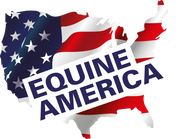Do You Think Your Horse Experiences Gastric Discomfort?

Horses are designed to trickle feed – grazing for up to 16 hours a day. This means that they need to constantly secrete acid to help digest this almost continual source of food entering their stomach. A grazing horse will also produce up to 9 gallons of saliva a day which as well as lubricating the food, also acts to buffer or neutralize the acid.
Furthermore, the physical presence of food in the stomach acts as a protective “mat” or barrier, helping to prevent acid splashing on to the upper, unprotected areas of the stomach.
So, if access to forage (pasture, hay, haylage) is restricted, acid continues to be produced, and with restricted chewing time, less saliva is produced to buffer the acid.
The lower portion of the stomach (the glandular area), where the acid is produced, is naturally protected including mucous production and bicarbonate secretion, but the upper portion of the stomach (squamous area) has no such protection.
If the horse is worked with a mainly empty stomach, when he trots, canters or jumps, or even just tenses his abdominal muscles, this acid can splash or be squeezed up to the unprotected area of the stomach.
The horse has a small stomach, and food does not stay in there for very long, so even short periods during the day without access to forage can cause problems.
Some horses at grass 24/7 still have gastric discomfort and in addition to restricted access to forage, there are other factors which have been reported to increase the incidence and severity of ulcers, including:
- Stress – social stressors such as bullying from stable neighbours or herd mates, or box location (for example near the feed room or muck heap, resulting in increased activity past the door) have been shown to increase the risk of ulcers
- High starch diets – may result in increased volatile fatty acid production in the stomach, which may in turn result in abnormalities with sodium transport leading to cell damage in the stomach.
- Limited turnout and reduced access to natural antioxidants from grass
- Intense training and competition schedules and frequent travelling, especially long distance.
What are signs that my horse would show if they have gastric discomfort?
Horses can show signs of poor appetite which can lead to decreased performance, and condition or muscle loss. Loss of weight and appetite can cause them to have lack of energy or stamina and increased periods of laying down. They can experience change in attitude due to being uncomfortable – reluctance to move off the leg or suddenly refusing to jump, and may show discomfort around their flanks, resenting girthing and grooming or may even show signs of lameness.
What can I do to help support the horse’s digestive heath?
- Turnout to grass where practical and possible, ideally with a placid companion, even if only for short periods.
- Ensure ad lib forage where practical. For good doers, where calories are restricted, offer very frequent, but controlled amounts of forage, with the largest allocation overnight. Select clean, but low-calorie forage to enable larger amounts to be offered.
- Offer forage in different locations in the stable to encourage natural foraging behavior.
- Try to reduce social stressors such as bullying stable mates, or proximity to the feed store.
- Feed a good double handful (or 1 round scoop) of alfalfa chaff before exercise or competition warm-up to provide a protective barrier in the stomach - even if forage is available in the stable or lorry.
- Consider replacing some starch-based calories with oil, such as Equine America Supreme Omega Oil in the diet.
Are there any nutritional products to consider supporting my horse?
If you suspect your horse may have gastric discomfort, in addition to implementing appropriate management changes, you should have a discussion with your vet, as your horse may require further diagnostic investigations such as gastroscopy, and possibly medication.
However, in addition to veterinary intervention, if required, targeted nutritional support will also be beneficial, to support gastric health, and improve digestive comfort and wellbeing.
ULS GARD PELLETS – EQUINE AMERICA
Equine America Uls Gard Pellets are an advanced, effective and highly palatable pelleted formulation to help maintain digestive health and comfort.
- Contains key ingredients traditionally used to help soothe the stomach lining by producing mucilage which acts as a physical barrier for the unprotected upper portion of the stomach including pectins, marshmallow root and liquorice.
- Lecithin - a special type of fat which helps to support healthy stomach lining cells.
- Aloe vera and Glycine - to help support the gastric mucosa (lining of the stomach).
- Beta glucans from high nucleotide yeast to support gastric content viscosity.
- Slow-release calcium and magnesium from marine algae, to help maintain a healthy gut pH.
- Pre and Probiotics to help support a healthy gut microbiome.
- On a palatable alfalfa and soya hulls base, to provide a fibrous “mat”.
- BETA NOPS and UFAS accredited, ensuring our products do not contain prohibited substances and are suitable for horses competing under FEI regulations and the Rules of Racing.
Also available in a liquid form which can be syringed for very fussy feeders.
Pro Gut Balancer is a triple action probiotic which may also be beneficial to provide further support for the digestive system.
Be one step ahead with Equine America
 Skip to content
Skip to content

